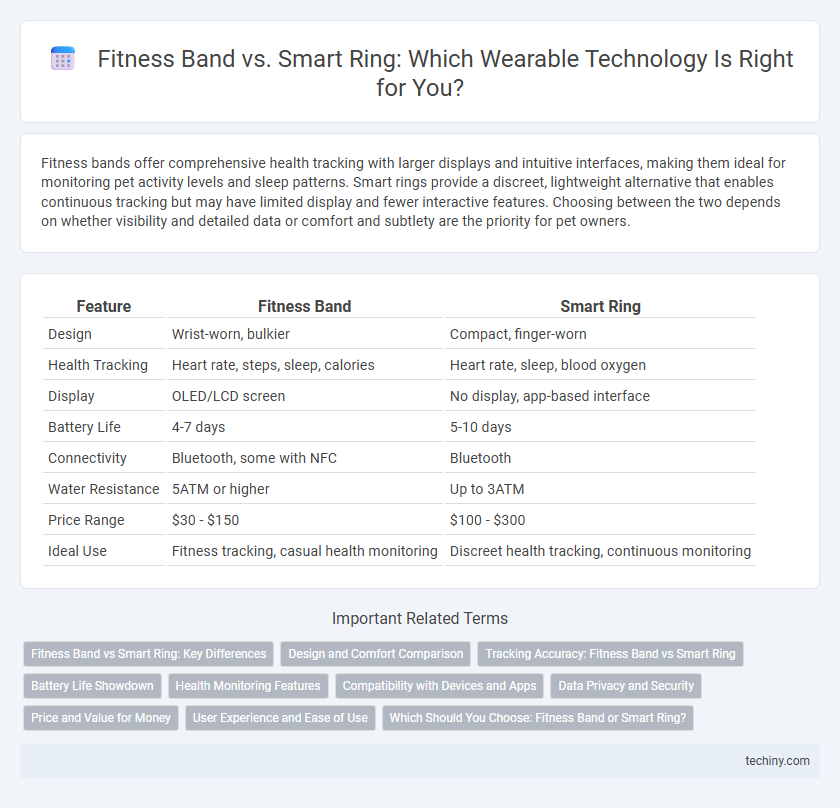Fitness bands offer comprehensive health tracking with larger displays and intuitive interfaces, making them ideal for monitoring pet activity levels and sleep patterns. Smart rings provide a discreet, lightweight alternative that enables continuous tracking but may have limited display and fewer interactive features. Choosing between the two depends on whether visibility and detailed data or comfort and subtlety are the priority for pet owners.
Table of Comparison
| Feature | Fitness Band | Smart Ring |
|---|---|---|
| Design | Wrist-worn, bulkier | Compact, finger-worn |
| Health Tracking | Heart rate, steps, sleep, calories | Heart rate, sleep, blood oxygen |
| Display | OLED/LCD screen | No display, app-based interface |
| Battery Life | 4-7 days | 5-10 days |
| Connectivity | Bluetooth, some with NFC | Bluetooth |
| Water Resistance | 5ATM or higher | Up to 3ATM |
| Price Range | $30 - $150 | $100 - $300 |
| Ideal Use | Fitness tracking, casual health monitoring | Discreet health tracking, continuous monitoring |
Fitness Band vs Smart Ring: Key Differences
Fitness bands typically offer larger displays and more detailed fitness tracking features compared to smart rings, which are compact and focus on discrete monitoring such as heart rate and sleep quality. Fitness bands provide comprehensive metrics including step count, GPS tracking, and workout modes, while smart rings emphasize comfort and continuous wearability with limited but precise health data. Battery life in fitness bands generally ranges from 5 to 14 days, whereas smart rings often last longer, up to 7 days or more, due to their smaller screens and minimal interface.
Design and Comfort Comparison
Fitness bands typically feature larger displays and adjustable straps, offering a bulkier design compared to smart rings, which are compact and lightweight, designed for discreet wear on the finger. Smart rings provide enhanced comfort for continuous use due to their minimalistic form factor and absence of wrist pressure points, making them suitable for all-day wear, including sleep tracking. Fitness bands may cause discomfort during extended wear, especially during physical activities, due to their size and strap material, whereas smart rings eliminate this issue with ergonomic design optimized for longer, unobtrusive use.
Tracking Accuracy: Fitness Band vs Smart Ring
Fitness bands typically offer more precise tracking accuracy than smart rings due to larger sensors and enhanced algorithms for monitoring heart rate, steps, and sleep patterns. Advanced optical sensors in fitness bands provide continuous biometric data, whereas smart rings may have limitations in sensor size and placement, potentially affecting the consistency of health metrics. Despite these differences, both devices leverage accelerometers and photoplethysmography (PPG) technology to deliver reliable activity and wellness tracking tailored to user preferences.
Battery Life Showdown
Fitness bands typically offer longer battery life, averaging 5 to 14 days per charge, compared to smart rings, which generally last around 2 to 7 days. The larger battery capacity and less frequent display use in fitness bands contribute to extended usage between charges. Smart rings prioritize compact design and continuous biometric monitoring, which can lead to shorter battery duration despite advancements in energy efficiency.
Health Monitoring Features
Fitness bands offer comprehensive health monitoring features such as continuous heart rate tracking, sleep analysis, blood oxygen level measurement, and real-time activity statistics. Smart rings provide discrete health insights with sensors for heart rate, sleep quality, and stress monitoring, emphasizing convenience and comfort. Both devices utilize advanced biometric sensors and companion apps to deliver personalized health data, but fitness bands generally support more extensive tracking and display options for fitness enthusiasts.
Compatibility with Devices and Apps
Fitness bands typically offer broad compatibility with both Android and iOS devices, supporting major fitness apps like Google Fit, Apple Health, and Fitbit. Smart rings, while often compatible with popular smartphones, may have more limited app integrations and device support due to their compact design. Choosing between the two depends on user preference for device ecosystem and specific app features.
Data Privacy and Security
Fitness bands typically offer extensive data tracking but may pose higher risks due to larger data volumes susceptible to breaches, while smart rings, with their limited sensor arrays, generate less personal data, potentially reducing exposure to privacy threats. Both devices implement encryption protocols and biometric authentication to safeguard user information, but smart rings often benefit from streamlined software architectures enhancing security. Users prioritizing data privacy should evaluate manufacturers' transparency policies and update practices to minimize vulnerabilities in wearable technology ecosystems.
Price and Value for Money
Fitness bands generally offer a broader range of features like heart rate monitoring, sleep tracking, and built-in GPS at a mid-range price, making them a cost-effective choice for comprehensive fitness tracking. Smart rings, while often more expensive due to their compact design and advanced sensors, provide discreet and continuous monitoring, adding unique value for users prioritizing convenience and style. Comparing both, fitness bands deliver robust functionality for the price, whereas smart rings cater to niche users seeking a minimalist form factor with premium technology.
User Experience and Ease of Use
Fitness bands offer a larger display and more intuitive touch controls, enhancing real-time interaction and detailed workout tracking for users. Smart rings provide a discreet, lightweight design ideal for continuous wear and basic notifications, but often lack comprehensive metrics and a visual interface. User experience favors fitness bands for extensive data visualization, while smart rings excel in comfort and unobtrusiveness during daily activities.
Which Should You Choose: Fitness Band or Smart Ring?
Choosing between a fitness band and a smart ring depends on your activity tracking needs and style preferences. Fitness bands offer comprehensive health metrics such as heart rate, sleep stages, and workout modes with larger displays for detailed insights. Smart rings provide discreet, lightweight monitoring primarily for sleep and basic activity, making them ideal for minimalistic users who prioritize comfort and continuous wear.
Fitness Band vs Smart Ring Infographic

 techiny.com
techiny.com